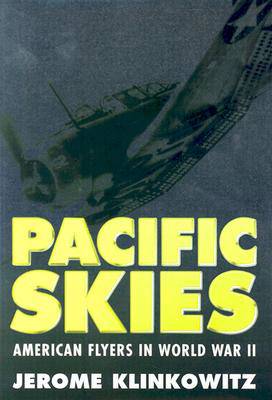
Door een staking bij bpost kan je online bestelling op dit moment iets langer onderweg zijn dan voorzien. Dringend iets nodig? Onze winkels ontvangen jou met open armen!
- Afhalen na 1 uur in een winkel met voorraad
- Gratis thuislevering in België vanaf € 30
- Ruim aanbod met 7 miljoen producten
Door een staking bij bpost kan je online bestelling op dit moment iets langer onderweg zijn dan voorzien. Dringend iets nodig? Onze winkels ontvangen jou met open armen!
- Afhalen na 1 uur in een winkel met voorraad
- Gratis thuislevering in België vanaf € 30
- Ruim aanbod met 7 miljoen producten
Zoeken
€ 48,95
+ 97 punten
Omschrijving
From 1941 to 1945 the skies over the Pacific Ocean afforded the broadest arena for battle and the fiercest action of air combat during World War II. It was in the air above the Pacific that America's involvement in the war began. It was in these skies that air power launched from carriers became a new form of engagement and where the war ultimately ended with kamikaze attacks and with atomic bombs dropped over Japan. Throughout the conflict American flyers felt a compelling call to supplement the official news and military reports. In vivid accounts written soon after combat and in reflective memoirs recorded in the years after peace came, both pilots and crew members detailed their stories of the action that occurred in the embattled skies. Their first-person testimonies describe a style of warfare invented at the moment of need and at a time when the outcome was anything but certain. Gathering more than a hundred personal narratives from Americans and from Japanese, Pacific Skies recounts a history of air combat in the Pacific theater. Included are the words of such famous aces and bomber pilots as Joe Foss, Pappy Boyington, Dick Bong, and Curtis Lemay, as well as the words of many rank-and-file airmen. Together their stories express fierce individualism and resourcefulness and convey the vast panorama of war that included the skies over Pearl Harbor, Wake, and Guadalcanal and missions from Saipan and Tinian. As Pacific Skies recounts the perilous lives of pilots in their own words, Jerome Klinkowitz weaves the individual stories into a gripping historical narrative that exposes the shades of truth and fiction that can become blurred over time. A book about experiencing and remembering, Pacific Skies also is a story of unique perspectives on the war.
Specificaties
Betrokkenen
- Auteur(s):
- Uitgeverij:
Inhoud
- Aantal bladzijden:
- 285
- Taal:
- Engels
Eigenschappen
- Productcode (EAN):
- 9781578066520
- Verschijningsdatum:
- 4/06/2004
- Uitvoering:
- Hardcover
- Formaat:
- Genaaid
- Afmetingen:
- 165 mm x 235 mm
- Gewicht:
- 671 g

Alleen bij Standaard Boekhandel
+ 97 punten op je klantenkaart van Standaard Boekhandel
Beoordelingen
We publiceren alleen reviews die voldoen aan de voorwaarden voor reviews. Bekijk onze voorwaarden voor reviews.











